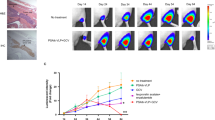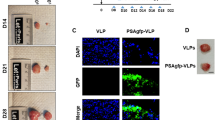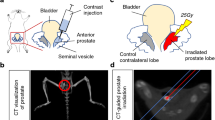Abstract
To develop a novel gene therapeutic modality for the effective treatment of benign prostatic hyperplasia (BPH), we investigated the properties of toxic gene therapy utilizing prostate-specific antigen (PSA) promoter driving herpes simplex virus thymidine kinase (HSV-TK) suicide gene to induce highly selective molecular ablation of epithelial cells with minimal systemic toxicity in canine prostate. Replication-defective recombinant adenoviral vectors containing HSV-TK gene under transcriptional control of long PSA promoter (Ad-PSA-HSV-TK) were developed and delivered in an situ manner. Briefly, laparotomies were performed and Ad-PSA-HSV-TK (1 × 109 PFUs) was injected into the left lateral lobe of prostate only on days 1 and 7 with appropriate prodrug acyclovir in adult Beagle dogs. The therapeutic efficacy was evaluated on the 56th experimental day. The striking apoptosis of epithelial cells was identified in the treated left half of canine prostate on TUNEL assay. On immunohistochemical studies, there was markedly decreased number of PSA-secreting epithelial cells compared to control. Also significant atrophy of prostate glands, associated with dense infiltration of lymphocytes and plasma cells, was identified in the treated side. The PSA promoter-based suicide gene therapy induced highly selective and definite ablation of epithelial cells in benign canine prostate. Our novel approach could open opportunity of gene therapeutic modality for the treatment of clinical BPH.
This is a preview of subscription content, access via your institution
Access options
Subscribe to this journal
Receive 12 print issues and online access
$259.00 per year
only $21.58 per issue
Buy this article
- Purchase on Springer Link
- Instant access to full article PDF
Prices may be subject to local taxes which are calculated during checkout




Similar content being viewed by others
References
Parker SH, Tong T, Bolden S, Wingo PA . Cancer statistics 1996. CA Cancer J Clin 1996; 46: 5–27.
Saginer PP et al. Results of an epidemiological survey using a modified American Urological Association Symptom Index for benign prostatic hyperplasia in France. J Urol 1994; 151: 1266–1270
Chute CG et al. The prevalence of prostatism: a population-based survey of urinary symptoms. J Urol 1993; 150: 85–89.
Stamey TA, Kabalin JN . Prostatic specific antigen in the diagnosis and treatment of adenocarcinoma of the prostate. I. Untreated patients. J Urol 1989; 141: 1070–1075.
Latham JP, Searle PF, Mautner V, James ND . Prostate-specific antigen promoter/enhancer driven gene therapy for prostatic cancer: construction and testing of tissue-specific adenovirus vector. Cancer Res 2000; 60: 334–341.
Martiniello-Wilks R et al. In vivo gene therapy for prostate cancer: preclinical evaluation of two different enzyme-directed prodrug therapy system delivered by identical adenovirus vectors. Hum Gene Ther 1998; 9: 1617–1626.
Moolten FL . Tumor chemosensitivity conferred by inserted herpes thymidine kinase genes: paradigm for a prospective cancer control strategy. Cancer Res 1986; 46: 5276–5281.
Moolten FL, Wells JM . Curability of tumors bearing herpes simplex thymidine kinase gene transferred by retroviral vectors. J Natl Cancer Inst 1990; 84: 297–300.
Shalev M et al. Suicide gene therapy for prostate cancer using a replication-deficient adenovirus containing the herpes virus thymidine kinase gene. World J Urol 2000; 18: 125–129.
Shalev M et al. Suicide gene therapy toxicity after multiple and repeat in patients with localized prostate cancer. J Urol 2000; 163: 1747–1750.
Feng M et al. Neoplastic reversion accomplished by high efficiency adenoviral-mediated delivery of an anti-ras ribozyme. Cancer Res 1995; 55: 2024–2028.
Graham FL, Prevec L . Methods for construction of adenovirus vectors. Mol Biotechnol 1995; 3: 207–220.
Xu HJ et al. Enhanced tumor suppressor gene therapy via replication-deficient adenovirus vectors expressing an N-terminal truncated retinoblastoma protein. Cancer Res 1996; 56: 2245–2249.
Rocco JW et al. P16/INK4A adenovirus-mediated gene therapy for human head and neck squamous cancer cell. Clin Cancer Res 1998; 4: 1697–1704.
Lowseth LA, Gerlach RF, Gillett NA, Muggenburg BA . Age-related changes in the prostate and testes of the beagle dog. Vet Pathol 1990; 27: 347–353.
Steiner MS, Zhang Y, Carraher J, Lu Y . In vivo expression of prostate-specific adenovirus vectors in a canine model. Cancer Gene Ther 1999; 6: 456–464.
Vile RG, Hart IR . In vitro and in vivo targeting of gene expression to melanoma cells. Cancer Res 1993; 53: 962–967.
Macri P, Gordon JW . Delayed morbidity and mortality of albumin/SV 40 T-antigen transgenic mice after insertion of an alpha-fetoprotein/herpes virus thymidine kinase transgene and treatment with gancyclovir. Hum Gene Ther 1994; 5:175–182.
Lu Y et al. Delivery of adenoviral vectors to the prostate for gene therapy. Cancer Gene Ther 199; 6: 64–72.
Lu Y, Steiner MS . Transcriptionally regulated adenoviruses for prostate-specific gene therapy. World J Urol 2000; 18: 93–101.
Watt KW et al. Human prostate-specific antigen: structure and functional similarity with serine proteases. Proc Natl Acad Sci USA 1986; 83: 3166–3170.
McEntee M, Isaacs W, Smith C . Adenocarcinoma of canine prostate: immunohistochemical examination for secretory antigens. Prostate 1987; 11: 163–170.
Pang S et al. Prostate tissue specificity of the prostate-specific antigen promoter isolated from a patient with prostate cancer. Hum Gene Ther 1995; 6: 1417–1426.
Gotoh A et al. Deveolpment of prostate-specific antigen promoter-based gene therapy for androgen-independent human prostate cancer. J Urol 1998; 160: 220–229.
Elshami AA et al. Gap junctions play a role in the ‘bystander effect’ of the herpes simplex virus thymidine kinase/gancyclovir sytem in vitro. Gene Therapy 1996; 3: 85–92.
Bi WL, Parysek LM, Warnick R, Stambrrok PL . In vitro evidence that metabolic cooperation is responsible for the bystander effect observed with HSV-TK retroviral gene therapy. Hum Gene Ther 1993; 4: 725–731.
Perez-Cruet MJ et al. Adenovirus-mediated gene therapy of experimental gliomas. J Neurosci 1994; 39: 506–511.
Herman JR et al. In situ gene therapy for adenocarcinoma of the prostate a phase I clinical trial. Hum Gene Ther 1999; 10: 1239–1249.
Park JY et al. Retinoids augment the bystander effect in vitro and in vivo in herpes simplex virus thymidine kinase/gancyclovir mediated gene therapy. Gene Therapy 1997; 4: 909–917.
Touraine RL et al. Enhancement of the herpes simplex virus thymidine kinase/gancyclovir bystander effect and its antitumor efficacy in vivo by pharmacologic manipulation of gap junctions. Hum Gene Ther 1998; 9: 2385–2391.
Acknowledgements
This study was supported by the Korea University Gene Therapy Center Foundation. This study was also supported by the Korea University Grant in 2002.
Author information
Authors and Affiliations
Rights and permissions
About this article
Cite this article
Park, H., Cheon, J., Cho, H. et al. In vivo characterization of a prostate-specific antigen promoter-based suicide gene therapy for the treatment of benign prostatic hyperplasia. Gene Ther 10, 1129–1134 (2003). https://doi.org/10.1038/sj.gt.3301972
Received:
Accepted:
Published:
Issue Date:
DOI: https://doi.org/10.1038/sj.gt.3301972
Keywords
This article is cited by
-
Enhanced combined tumor-specific oncolysis and suicide gene therapy for prostate cancer using M6 promoter
Cancer Gene Therapy (2009)
-
Vector-based RNA interference against vascular endothelial growth factor-A significantly limits vascularization and growth of prostate cancer in vivo
Cancer Gene Therapy (2005)



